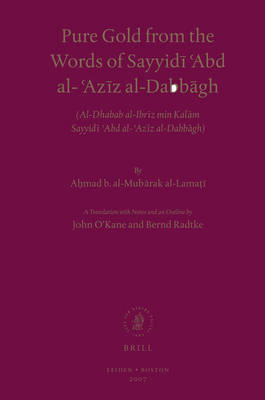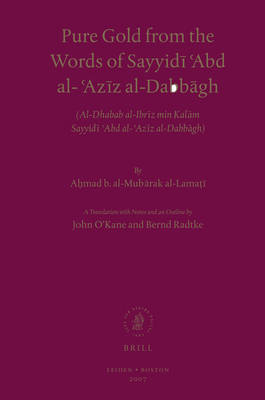
- Afhalen na 1 uur in een winkel met voorraad
- Gratis thuislevering in België vanaf € 30
- Ruim aanbod met 7 miljoen producten
- Afhalen na 1 uur in een winkel met voorraad
- Gratis thuislevering in België vanaf € 30
- Ruim aanbod met 7 miljoen producten
Zoeken
€ 421,45
+ 842 punten
Omschrijving
Around 1720 in Fez Aḥmad b. al-Mubārak al-Lamaṭī, a religious scholar, wrote down the words and teachings of the Sufi master ʿAbd al-ʿAzīz al-Dabbāgh. Al-Dabbāgh shunned religious studies but, having reached illumination and met with the Prophet Muḥammad, he was able to explain any obscurities in the Qurʾān, ḥadīths and sayings of earlier Sufis. The resulting book, known as the Ibrīz, describes how al-Dabbāgh attained illumination and access to the Prophet, as well as his teachings about the Council of the godly that regulates the world, relations between master and disciple, the darkness in men's bodies, Adam's creation, Barzakh, Paradise and Hell, and much more besides.
This 'encyclopaedia' of Sufism with its many teaching stories and illustrations provides a window onto social life and religious ideas in Fez a generation or so before powerful outside forces began to play a role in the radical transformation of Morocco.
This 'encyclopaedia' of Sufism with its many teaching stories and illustrations provides a window onto social life and religious ideas in Fez a generation or so before powerful outside forces began to play a role in the radical transformation of Morocco.
Specificaties
Betrokkenen
- Auteur(s):
- Uitgeverij:
Inhoud
- Aantal bladzijden:
- 1016
- Taal:
- Engels
- Reeks:
- Reeksnummer:
- nr. 1
Eigenschappen
- Productcode (EAN):
- 9789004164154
- Verschijningsdatum:
- 15/10/2007
- Uitvoering:
- Hardcover
- Formaat:
- Genaaid
- Afmetingen:
- 175 mm x 244 mm
- Gewicht:
- 1927 g

Alleen bij Standaard Boekhandel
+ 842 punten op je klantenkaart van Standaard Boekhandel
Beoordelingen
We publiceren alleen reviews die voldoen aan de voorwaarden voor reviews. Bekijk onze voorwaarden voor reviews.








